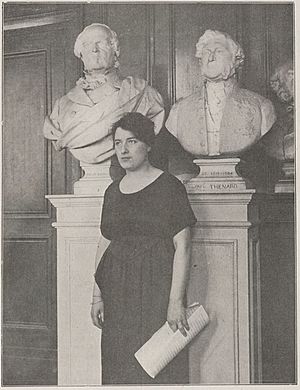Marguerite Canal facts for kids
Marguerite Canal (born Marie-Marguerite-Denise Canal) was a talented French musician. She was born in Toulouse, France, on January 29, 1890. Her family loved music, and her father helped her discover her passion for music and poetry from a young age.
Marguerite grew up to be a conductor, a music teacher, and a composer. She studied singing and piano at the famous Paris Conservatoire, a top music school, starting in 1911. After finishing her studies, she became a teacher there, sharing her knowledge with new students.
A Trailblazer in Music
Marguerite Canal made history in the music world. In 1917, she became the very first woman in France to conduct an orchestra. This was a huge step forward for women in music at the time.
Winning the Grand Prix
In 1919, she became a singing professor at the Conservatoire. Then, in 1920, she achieved another amazing feat. She was only the second woman ever to win the First Grand Prix of Rome in musical composition. This was a very important award for composers in France. She won it for her work called Don Juan. Even the famous composer Camille Saint-Saëns congratulated her!
After winning this prestigious prize, Marguerite left her teaching job. She went to live at the Villa Medici in Rome, Italy, in 1925. This was a special place where artists and musicians could live and work. She stayed there for several years, focusing on her compositions.
Returning to France
Marguerite Canal returned to France in 1932. She continued her work as a musician and composer until she retired. A music expert named Mario Facchinetti once said about her in 1956: "Marguerite Canal is an inspired composer who keeps to the French style of Fauré, Debussy and Duparc, a style that is sober, noble and pure." This means her music was beautiful, clear, and followed a classic French style.
She spent her retirement years in Cepet, a town near her birthplace of Toulouse. Marguerite Canal passed away there on January 27, 1978, just before her 88th birthday.
Notable Musical Works
Marguerite Canal mostly wrote music for voices and instruments. She was especially known for her songs. Here are some of her important works:
- Don Juan, a drama piece, composed in 1920.
- Requiem, a sacred musical piece, from 1921.
- Sonata for Violin and Piano, written in 1922.
- Le Jardin de L'Infante (The Infanta's Garden), based on a poem by A. Samain.
- Nell, based on a poem by Leconte de Lisle.
- Ici bas tous les lilas Meurent (Here Below All Lilacs Die), based on a poem by Sully Prud'homme.
- Douceur du Soir (Sweetness of Evening), based on a poem by G. Rodenbach.
- Un grand sommeil noir (A Great Black Sleep), based on a poem by Verlaine.
- Ecoutez la chanson bien douce (Listen to the Very Sweet Song), based on a poem by Verlaine.
- Il pleure dans mon coeur (It Rains in My Heart), based on a poem by Verlaine.
- Amours triestes, a collection of sad songs.
- Tlass alka, an opera she started in 1922 but never finished.
Some of her music has been recorded and released on CDs, including a collection called Marguerite Canal (1890-1978) Songs, Sonata for Violin and Piano.
 | Chris Smalls |
 | Fred Hampton |
 | Ralph Abernathy |


